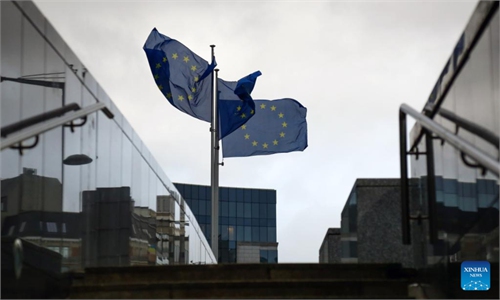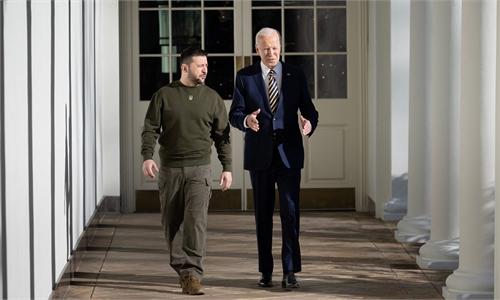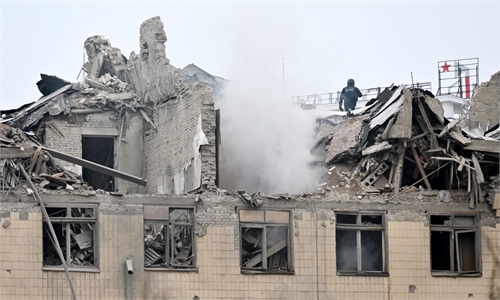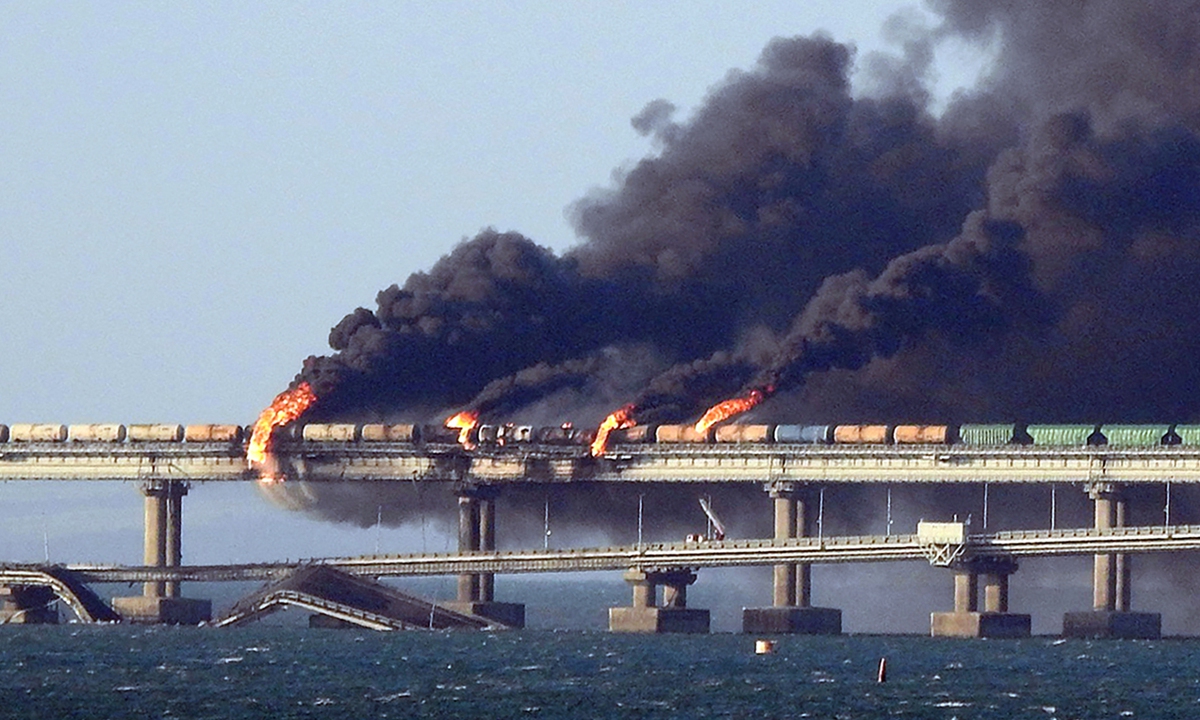
Black smoke billows from a fire on the Crimean Bridge in the Kerch Strait connecting the Black Sea and the Sea of Azov on October 8, 2022. Photo: VCG
Editor's Note:
The Russia-Ukraine conflict is approaching its one-year mark, with no end in sight. It is eating up scarce European resources, preventing millions of refugees from returning home and weakening the global economic outlook while the US and some European countries are fanning the flames of the war, keeping sending weapons to Ukraine. How will the Russia-Ukraine conflict end? What are the biggest stumbling blocks for negotiation and diplomatic resolution?
In an interview with Global Times, George Galloway (Galloway), six-term British parliamentarian, told Global Times (GT) reporter Li Aixin that a precondition to an end of conflict "is not just that Ukraine will never apply to join NATO. It's that NATO will never be in Ukraine, neither their weapons nor their personnel, nor their geostrategic worldview."
This is the first installment of the series.
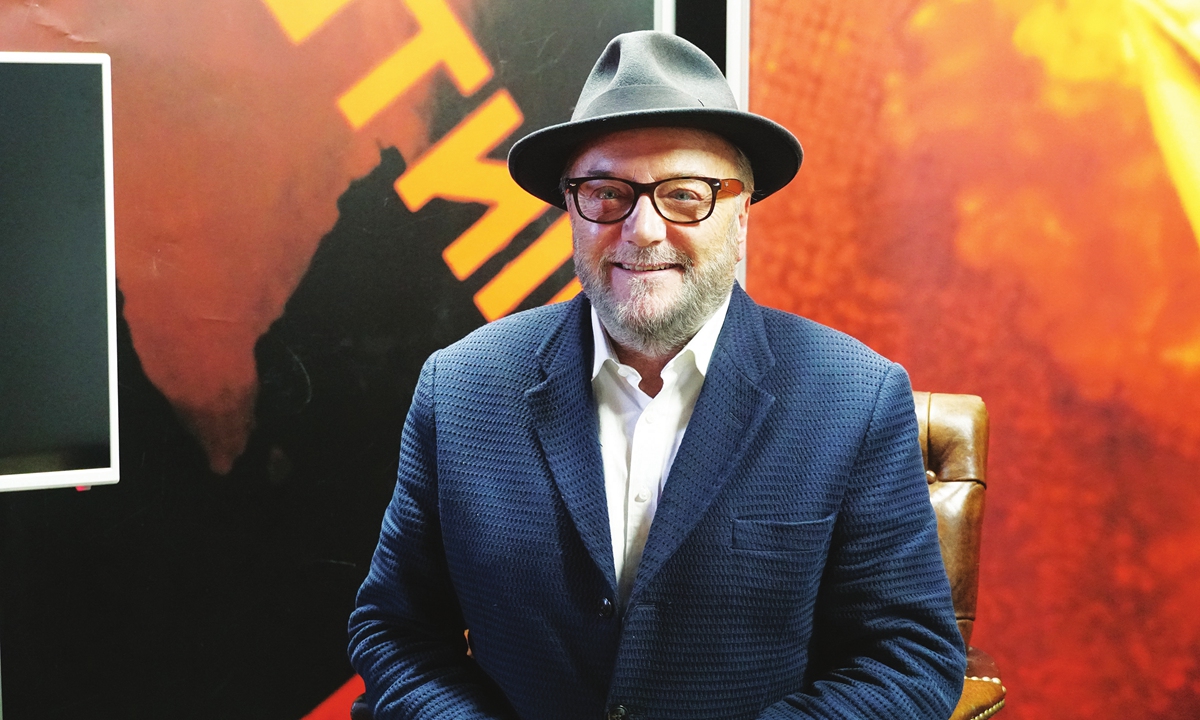
George Galloway
GT: Where do you think the conflict is headed in 2023?
Galloway: I think the military, political situation in Ukraine has reached an important turning point. It seems that some units are being withdrawn from the long battle in backward. The rest, I presume, will follow. If not, they'll be overrun by the Russian armed forces, possibly even in days, rather than weeks. This has become a kind of Battle of Stalingrad, which 80 years ago was the turning point in the World War II.
The political situation will escalate further and faster on the back of the military defeat and strategic defeat. There's already the replacement of the defense minister. Unless the Ukrainians get a government that is free to negotiate an end to a political agreement, and an end to the conflict, the military situation will deteriorate very sharply and steeply for them over the next couple of months.
GT: What do you think will be the biggest stumbling block for negotiation and a diplomatic resolution of the conflict?
Galloway: The West is ready to fight to the last drop of Ukrainian blood, but not their own. The main stumbling block is getting higher every day. If an agreement had been reached nine months ago, it would have been less costly to Ukraine than it is nine months later, and less than it will be 10, 12, or 15 months later. So the prices are rising over a negotiated end.
But there are certain preconditions for Russia to stop fighting. And one of those is not just that Ukraine never joins NATO. Ukraine never did join NATO, but NATO joined it. NATO was everywhere in Ukraine, even though Ukraine was not a member. That's something that would have to be attended to in a diplomatic agreement.
So a precondition is not just that Ukraine will never apply to join NATO. It's that NATO will never be in Ukraine, neither their weapons nor their personnel, nor their geostrategic world view. The Ukraine would have to be a truly neutral state. I don't think that's easy to envisage right now. Apart from anything else, the West has given them hundreds of billions of dollars and will not just walk away from that investment.
GT: As you mentioned, the US-led NATO member states are continuously sending weapons to Ukraine, including, recently, battle tanks. Some say the tanks could be a game changer. Some call for offering even more advanced weapons to Ukraine. How do you view those voices?
Galloway: The tanks certainly will not [be a game changer]. First of all, the American tanks, the Abrams tanks, didn't perform well either in Iraq or in Afghanistan, against insurgents or the improvised explosive devices by the side of the roads. The version of the Abrams tanks that the US has agreed to give to Ukraine is a version stripped off its most important capability, which is armored capability. They don't want to run the very high risk of this armor falling into Russian hands and being reversed, engineered with the secrets of the armor being obtained by Russia.
First of all, they are not proper Abrams tanks. Secondly, they will not be there before the end of the year, maybe even next year. And third, they are coming in insufficient numbers to make any kind of impact on the battlefield. So this is all show.
The German Panzers, which have crossed the Ukrainian border to fight Russians before. They are not coming in sufficient numbers either. The Germans are half-hearted about it. They have been forced, blackmailed even by their Western partners into allowing the supply of these weapons.
A few tanks here or there, even a couple of hundred tanks here or there, will not make any appreciable difference, but they will leave the NATO members virtually defenseless, having emptied their own inventories to supply Ukraine, which is using, but failing to replenish its material, at a quite extraordinary rate.
So it's a good thing that Russia has no intention of invading Western Europe, because if it did, it could be in Paris pretty damn quick because who, short of the use of nuclear weapons, is going to stop them? Luckily, I'm sure that's very far from the minds of the Russian leadership. They just want not to have enemy missiles on their border. That's why Ukraine will have to be completely demilitarized and properly neutralized before this conflict can end.
GT: In your show, you said, "Not a single Member of Parliament, not one, challenges the line that we're on in this war. There's a complete vacuum in politics. This is unprecedented in parliamentary history." What does it indicate?
Galloway: I sat in the British parliament for almost 30 years, and my experience was that when parliament was unanimous, it was almost always unanimously wrong, on small matters. It was never unanimous on the big matters.
Take the big issues on the Iraq war. Hundreds of members of parliament opposed, in the voting lobbies, the invasion and subsequent occupation of Iraq. So, on big issues, this has never happened before, but it's happened now.
Not one single member of parliament out of 650 has opposed the NATO war in Ukraine. That tells me that for all the trumpeting of democracy, free speech, freedom and liberty that the West does. It does so in inverse proportion to the reality, the reality is that democracy, as they used to define it, is more or less dead in Western countries.
GT: Rob Bauer, chairman of NATO's Military Committee, recently said that the alliance is "ready" for a direct confrontation with Russia. How likely do you think NATO would directly get involved in the conflict?
Galloway: It's not remotely likely, except if they want to escalate to nuclear conflict.
NATO is entirely incapable of confronting Russia in a conventional war. The British armed forces, who could all - army, navy and air force - fit into a football stadium, and not the biggest football stadium in England. They have one day's ammunition, according to the Daily Mail newspaper. They would quickly run out of ammunition. They will run out of men.
They would not be able to sustain a conflict with Russia for even a single week, even if they were fighting with the butts of their right. And Britain is the second most important military component of NATO, the US being the first. But even the US has only 100,000 soldiers in Europe, it does not have the capacity to rapidly reinforce with well trained, well equipped forces. That's a pretty poor, dead strength.
The other countries in NATO are paper tigers. They are painted in military colors, but they have no military capability worth mentioning and no public support for military adventures.
If it goes nuclear, it's the end of the world. And would their armed forces be prepared to do that? Would they overthrow their governments, if asked to do that? Would the public sit by while that became increasingly likely? These are all very big questions.
So my advice to the Chinese people and government is not to be afraid of this paper tiger. They have never been weaker, and have never been more obvious that they are weak.
GT: With that being the case, can Europe's security still depend on NATO?
Galloway: No, the only way that we can have a secure future is to have a security architecture which includes everybody, not one that is constructed against somebody. If we take Russia. Germany and Russia had very good relation in recent decades. Germany was more than 50 percent dependent on very cheap and reliable Russian energy. There was absolutely no need for any conflict between the two at all.
To be fair, both Angela Merkel and even Emmanuel Macron have repeatedly called for a security architecture that includes Russia. But the Anglo-Saxon relationship, Australia, New Zealand, Canada, the US, and Britain, with the one or two other countries adding their eyes to the Five Eyes have never permitted, and now have destroyed any possibility of Russia-German, Russia-French partnership, either in the security field or any other field. If we are to be secure, it can only be achieved by agreement, by negotiation, by something for everybody approach.
President Putin laid out what such architecture would look like, not yesterday, but long ago, in 2008 in Munich, in which he sketched what that security architecture could be and needed to be. And the same is true with China. What the North Atlantic Treaty Organization has to do with the Pacific Ocean, the South China Sea, the straits of Taiwan, is very difficult to see. Unless the NATO countries basically overthrew their current system and became a militarized, a martial law society with the full militarization of their productive capacity, they are not in a position to fight either Russia or China still less both of them together.
GT: Against the backdrop, do you think an "Asian NATO" will come into being? NATO Secretary General Stoltenberg has recently visited South Korea and Japan, China was high on the agenda. If NATO does expand to Asia-Pacific, what would it bring to Europe and the world?
Galloway: NATO is really the US, so everything depends on what public support there is for war in the US.
From Donald Trump, we saw a very stridently hostile stand against the endless war, against NATO. The next presidential elections are in 2024. So, it is a distinct possibility that the US will elect a government that doesn't want to go further and further down this road.
But even if that's not the case, the US economy is so fragile. The US productive capacity on the military industrial level is so severely stretched. It's very unlikely that the US is in a position to fight a war in Asia.
And the rest are what I call Mussolinis. Mussolini used to go around the world, threatening people with Hitler's army. He didn't have an army of his own, but he could threaten them with Hitler's army. And that's what others are doing. Australia, for example, does Australia have an army? Can Australia fight China? No, it's an absurd proposition, but it can implicitly threaten China with US' army. But what if US' army itself is not able to get involved in mega wars? We were not talking about a local skirmish.
Politically speaking, an Asian NATO is in the making, although I'm not sure South Korea was all that turned on by Stoltenberg's latest visit. Not sure the South Korean people want to risk their prosperity by joining the war camp against China.
Japan is another thing. We don't know to what extent the formerly savage, racist, rapacious Japanese expansionism is still present in the hearts and minds of the Japanese people. That's why the attempts to dragoon Japan into an Asian NATO, confronting China are the most sinister of all. And that's the one I'd be keeping my eyes on most sharply.
